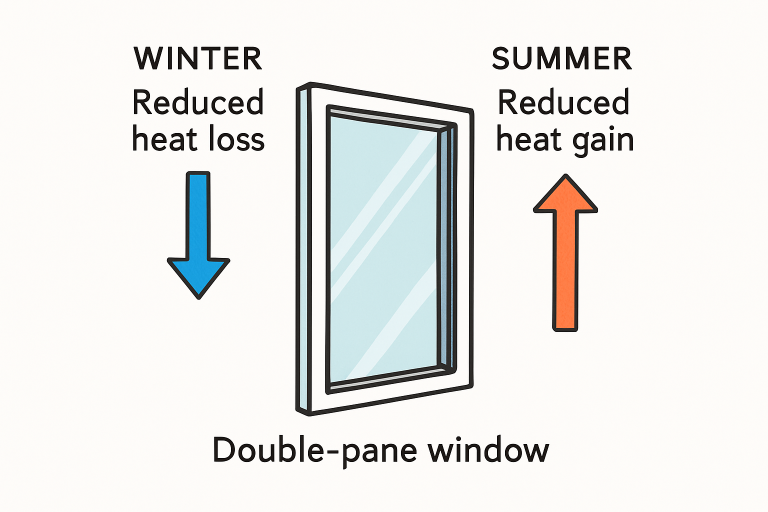Energy efficiency and window replacement: Save money and the environment
Key takeaways
- Replacing old windows boosts home energy efficiency and cuts utility bills.
- Energy-efficient windows reduce your carbon footprint and enhance comfort.
- Financial incentives and long-term savings help justify the investment.
- Identifying when to replace and how to maintain windows can maximize benefits.
Why window replacement matters for energy savings
Outdated or poorly insulated windows can cause significant heat loss in winter and heat gain in summer, making your home less energy-efficient. Replacing them with modern, energy-efficient windows can lower energy bills by around 12% or more, depending on climate and window quality.
Making the decision to upgrade doesn’t have to be daunting. A trusted window contractor in Madison can assess your current windows, recommend energy-saving options, and ensure a seamless installation process. Modern window replacements enhance comfort, lower energy costs, and boost property value, making them a smart investment for both homeowners and the environment.
Inefficient windows can cause drafts, condensation, and damage, while energy-efficient upgrades help prevent these issues. While temporary fixes, such as sealing gaps or applying window films, offer minor improvements, complete window replacement delivers the most significant long-term savings and sustainability benefits, especially in climates with high heating or cooling demands.
How energy-efficient windows work
Energy-efficient windows are designed with several advanced technologies that help prevent the transfer of heat in and out of your home. The secret lies in multiple layers of innovation. Most energy-saving windows use multiple panes of glass with an insulating gas, such as argon or krypton, between them. This design greatly reduces heat loss in winter and minimizes heat gain in summer, ensuring your HVAC system doesn’t have to work overtime.
Low-emissivity glass coatings represent another pivotal technology. These microscopic coatings reflect heat back into your home in the winter while allowing in plenty of natural daylight. The effect is a brighter, more comfortable living space that requires less energy to maintain year-round comfort. Modern window frames constructed from insulated vinyl, wood, or fiberglass with thermal breaks further enhance performance, helping to reduce energy leaks at every corner.

Environmental benefits of upgrading your windows
Reducing household energy use has a direct and measurable impact on the environment. The less electricity and natural gas you consume, the fewer greenhouse gases are released by power plants. This is especially important considering the increasing link between home energy consumption and climate change.
Window replacement not only saves you money but also helps you do your part in reducing your home’s overall carbon footprint. Upgrading to energy-efficient windows is widely recognized as an eco-friendly renovation, benefiting both the immediate environment and the planet as a whole.
Key features to look for in replacement windows
- ENERGY STAR® Labels: Look for windows that carry this mark, which ensures they meet or exceed federal guidelines for energy efficiency.
- Multiple Panes: Double or triple-pane windows with inert gas fills between the panes offer vastly superior insulation compared to single-pane models.
- Quality Framing Materials: Opt for frames constructed from insulated wood, vinyl, or fiberglass for improved thermal efficiency and durability.
- Professional Installation: Even the most efficient window will underperform if improperly installed. Hire experienced professionals to guarantee airtight seals and optimal operation.
Financial incentives and long-term savings
Investing in energy-efficient windows may feel like a significant upfront expense, but several programs are available to help offset costs. Many local and federal government agencies offer tax credits, rebates, or other incentives for energy-saving home improvements. These financial incentives can make window replacement projects much more affordable and accelerate your timeline for long-term savings.
Lower monthly utility bills will continue adding up even after the initial payback period. Over time, the increase in home value, reduction in repairs, and enhanced comfort make energy-efficient windows a wise choice. According to the U.S. Department of Energy, replacing your windows is an investment that delivers visible returns year after year, especially in regions subject to extreme climate fluctuations.
When is the right time to replace your windows?
Certain telltale signs signal that window replacement may be overdue. Drafts, condensation buildup between panes, and frames showing visible signs of rot or wear all indicate compromised insulation. Operational difficulties, such as stuck sashes or windows that won’t stay open, are other red flags. Don’t overlook subtle warning signs; even slight performance declines can lead to significant energy loss as time progresses. For more information on choosing the right replacement windows, see Consumer Reports’ buying guide.
Scheduling an annual home energy audit is a smart preventive step. An audit will pinpoint where energy escapes your home, revealing how much you could save with new, efficient windows. Over time, neglected windows can contribute to increased energy bills and broader environmental impacts.
Simple steps to boost window efficiency right now
- Add Window Film or Thermal Curtains: These can provide a temporary layer of insulation and reduce heat loss or gain.
- Seal Gaps with Caulk or Weatherstripping: Sealants can help block drafts and prevent leaks until you’re able to replace older windows.
- Inspect and Maintain Exterior Caulking: Keeping outside caulking in good condition helps deter air and water from entering your home and causing further inefficiency.
Making the smart choice for your home and the planet
Upgrading to energy-efficient windows is more than a practical home improvement; it’s an investment in lasting comfort, increased home value, and reduced environmental impact. Not only will your household enjoy lower energy bills and heightened comfort, but you’ll also contribute to a greener, more sustainable future. Simple changes can make a world of difference—starting with the right windows for your home.




